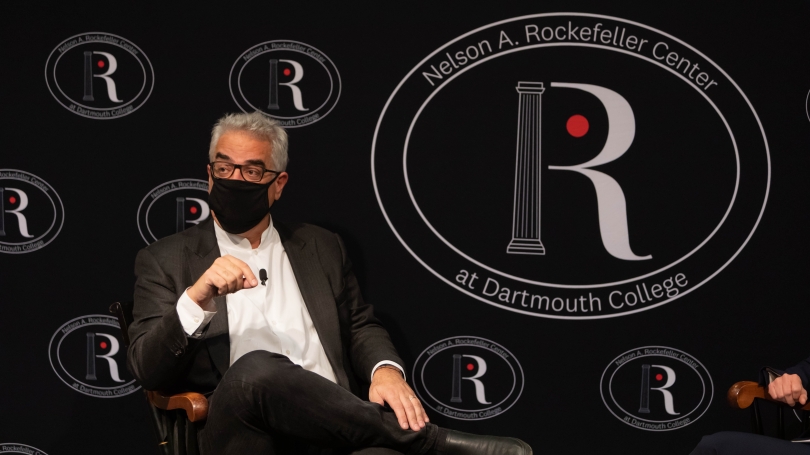
- Public Policy
- Leadership
- Funding
- News & Events
- About the Center
Back to Top Nav
Back to Top Nav
Back to Top Nav
Back to Top Nav
On November 2, 2021, Dr. Nicholas Christakis of Yale University joined members of the Dartmouth community to discuss the coronavirus pandemic. The discussion was moderated by Amber E. Barnato, the Director of The Dartmouth Institute for Health Policy and Clinical Practice.
Christakis directs the Human Nature Lab and focuses his work in the fields of network science, biosocial science, and behavioral genetics. His talk was focused on his 2020 best-selling book Apollo's Arrow: The Profound and Enduring Impact of Coronavirus on the Way We Live. The book offers readers a global history of widespread disease, discusses the social costs of such public health crises, and concludes with Christakis' predictions for the duration and eventual conclusion of the Covid-19 pandemic.
He began his remarks by announcing that living through the Covid-19 pandemic is a "deeply human experience." Like our ancestors, we are confronted with a "once-in-a-century" event in which a pervasive pathogen is released and circulates among us. "Plagues are a feature of the human experience," Christakis explained. "They're in the Bible. They're in the Iliad."
He remarked on the Covid-19 pandemic's catastrophic impacts. This is a $16 trillion virus; "$8 trillion of damage to our economy…and $8 trillion of damage because of the death, disability, and illness the virus caused us," said Christakis. "It's like going to every family of four in this country and taking away $200,000 from them." He argues that the economic ramifications are inevitable and apart from government restrictions; "economies need social interaction" and that ceases during pandemics. "It's not we who are causing our economy to collapse. It's the virus."
In addition to the $16 trillion in lost "destroyed" wealth, Christakis predicts one million Americans will fall victim to the virus when all is said and done. "I don't think people fully appreciate what has happened to us yet."
"Plagues are a time of loss. We lose our lives. We lose our livelihoods. And we lose our way of life." Pandemics "inflame all kinds of dark tendencies," explains Christakis. They result in widespread fear. "It is very typical in times of plague to try to demonize other people and to blame them."
He made predictions about the remaining timeline of this pandemic. Christakis explained that this "beginning phase" of the Covid-19 pandemic will last into 2022. By this time, "everyone in our country, probably everyone on the planet…will either be infected with the germ or be vaccinated…No one will escape."
The next phase will be ushered in via herd immunity. The timing of this will be complicated by the unpredictability of variants. When we eventually enter this "intermediate phase", we will find that we have been "devastated" and are left to "clean up the clinical, social, and psychological destruction" in the pandemic's wake. Virus-related disability, gaps in children's education, grief, job loss, higher taxes, and inflation are just some of the Covid-induced issues we will all need to deal with during this period.
The intermediate phase will last until 2024, Christakis predicts, and then we will enter the post-pandemic period. "I think that will be a little bit of a party," remarked Christakis. "Like any other collective threat…those of us who survive will rejoice." He predicts crowded restaurants and night clubs, jam-packed political rallies, and the loosening of sexual mores.
Ultimately, the pandemic will become endemic. He explained the characteristics of the Covid-19 virus that make it so pervasive and persistent. The pathogen's high contagiousness and relatively low lethality allows it to circulate through the human species globally. Variants are typically even less lethal and more contagiousness, so the virus can circulate even more widely, but this is not always the case.
If the Covid-19 pandemic were deadlier, "we would be experiencing a bubonic plague." It is for this reason, he explains, that governments treat respiratory pandemics as national security threats and impose restrictions accordingly. "This pandemic has been like pandemic-lite…and there is no God-given reason it is not worse…More pandemics are on the horizon."
He discussed risk tolerance and how political considerations determine what level of tolerance we are comfortable with. Christakis does not believe such a risk assessment is dissimilar from other political calculuses we make; think mass shootings, young adult suicide, or the opioid epidemic. "The opioid epidemic is vastly more deadly than coronavirus…and yet we just tolerate it."
"I think we have more woe ahead of us." Christakis predicts annual winter spikes of the virus. He praised the "singular achievement" of rapid vaccine development. The development in mRNA technology will allow us to confront future pandemics. He concluded by voicing support for global vaccination efforts. "[The U.S.] has a moral obligation to vaccinate the world…and it would only cost $50B." In an era of globalization, it is in our economic interest to do so.
"In addition to the moral and economic rationale, we have an epidemiological rationale," he posited. "To the extent that other parts of the world are unvaccinated or partially vaccinated, they are like petri dishes for the emergence for new, dangerous strains of the virus that will inevitably reach our shores."
He concluded by arguing that "plagues offer new challenges and new opportunities." Christakis finished on an optimistic note with a quotation from Albert Camus. "What we learn in time of pestilence: there are more things to admire in men than to despise."
By Blake McGill '22